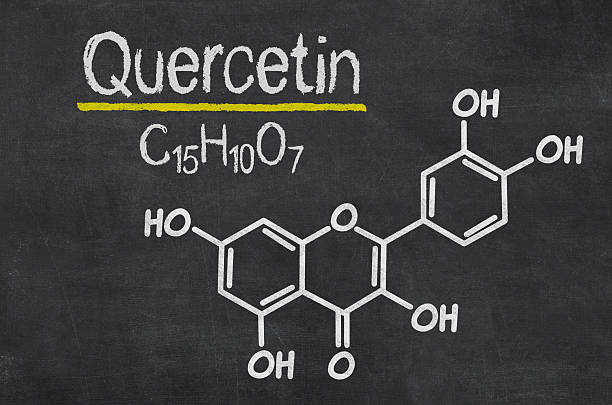In recent years, the spotlight on natural health supplements has shone brightly on a compound known as quercetin. This flavonoid, found in a variety of fruits, vegetables, and grains, has attracted considerable attention for its potential health benefits. From its antioxidant properties to its possible role in reducing inflammation, quercetin has become a subject of interest for both scientists and health enthusiasts alike. This article delves into the science behind quercetin, exploring its benefits, sources, and the latest research.
What is Quercetin?
Quercetin is a type of flavonoid, a class of plant pigments known for their antioxidant properties. It is naturally present in many foods, including apples, onions, berries, and green tea. Flavonoids like quercetin are known for their ability to neutralize free radicals—unstable molecules that can cause oxidative stress and damage cells. By combating oxidative stress, quercetin plays a role in promoting overall health and potentially preventing disease.
Health Benefits of Quercetin
- Antioxidant and Anti-Inflammatory Effects:
One of quercetin’s most celebrated benefits is its potent antioxidant activity. Oxidative stress is a contributor to chronic diseases such as heart disease, cancer, and neurodegenerative disorders. Quercetin helps neutralize free radicals, reducing oxidative damage to cells and tissues. Additionally, quercetin has anti-inflammatory properties, which can help modulate inflammatory responses in the body. Chronic inflammation is linked to numerous health issues, including arthritis, diabetes, and cardiovascular disease. By curbing inflammation, quercetin may support overall health and mitigate the risk of these conditions.
- Immune System Support:
Quercetin may bolster the immune system in several ways. Research suggests that it can enhance the activity of immune cells, including natural killer cells and T lymphocytes, which play critical roles in fighting off infections and diseases. Quercetin’s antiviral properties have also been investigated, with some studies indicating that it may help inhibit the replication of certain viruses, such as the common cold virus and the influenza virus.
- Cardiovascular Health:
Cardiovascular health is another area where quercetin shows promise. Studies have indicated that quercetin may help lower blood pressure and improve endothelial function—the health of the blood vessel linings. This can contribute to better circulation and a reduced risk of heart disease. Quercetin’s antioxidant and anti-inflammatory effects also play a role in supporting heart health by reducing oxidative damage and inflammation in the cardiovascular system.
- Allergy Relief:
For those who suffer from seasonal allergies, quercetin may offer some relief. It is thought to act as a natural antihistamine, helping to reduce symptoms such as runny nose, sneezing, and itching. Quercetin’s ability to stabilize mast cells (which release histamines) and inhibit histamine release contributes to its potential in managing allergic reactions.
- Cancer Prevention:
The potential of quercetin in cancer prevention is an exciting area of research. Laboratory studies have demonstrated that quercetin can induce apoptosis (programmed cell death) in cancer cells and inhibit tumor growth. It may also help prevent cancer by preventing oxidative damage and modulating signaling pathways involved in cancer development. While these findings are promising, more clinical studies in humans are needed to fully understand quercetin’s role in cancer prevention.
Dietary Sources of Quercetin
Incorporating quercetin into your diet is relatively simple, as it is abundant in various foods. Here are some rich sources of quercetin:
– Onions: Particularly red onions, which contain high levels of quercetin.
– Apples: Especially with the skin on, as it contains significant amounts of quercetin.
– Berries: Such as blueberries, cranberries, and blackberries.
– Citrus Fruits: Oranges, grapefruits, and lemons also contain quercetin.
– Leafy Greens: Kale, spinach, and broccoli are good sources.
– Tea: Green tea and black tea are known to have quercetin.
– Capers: These are exceptionally high in quercetin, though they are less commonly consumed.
Supplementation and Dosage
For those who may not get enough quercetin through diet alone, supplements are available. Quercetin supplements are often marketed as capsules or tablets and can be found in health food stores and online. The typical dosage ranges from 500 to 1,000 milligrams per day, but it is crucial to follow the recommended dosage on the supplement label or consult a healthcare provider for personalized advice.
Safety and Side Effects
Quercetin is generally considered safe when consumed through food sources or supplements at recommended dosages. However, high doses of quercetin supplements may cause mild side effects, such as headaches or digestive discomfort. It is always advisable to consult with a healthcare professional before starting any new supplement, especially if you have existing health conditions or are taking other medications.
Current Research and Future Directions
The body of research on quercetin is growing, with many studies highlighting its potential health benefits. However, while preliminary findings are promising, more rigorous clinical trials are needed to confirm these effects and establish optimal dosages. Future research may provide deeper insights into how quercetin interacts with other nutrients and medications, its long-term effects on health, and its potential applications in various medical conditions.
Conclusion
Quercetin stands out as a powerful flavonoid with a range of potential health benefits, from its antioxidant and anti-inflammatory properties to its possible role in supporting cardiovascular health and managing allergies. While the evidence supporting its benefits is compelling, it is important to continue exploring this compound through further research. By incorporating quercetin-rich foods into your diet and staying informed about ongoing research, you can harness the potential of this remarkable flavonoid to support your overall health and well-being.

